Key takeaways:
- Software testing certifications enhance skills and confidence, with a strong emphasis on structured learning for practical application.
- Effective software testing is vital for user satisfaction and company reputation, as thorough testing prevents significant setbacks.
- Networking and interacting with other professionals highlight the ongoing importance of education and community in the field of software testing.
- Time management and overcoming complex concepts were major challenges faced during the certification journey, which underscored the need for persistence and support.
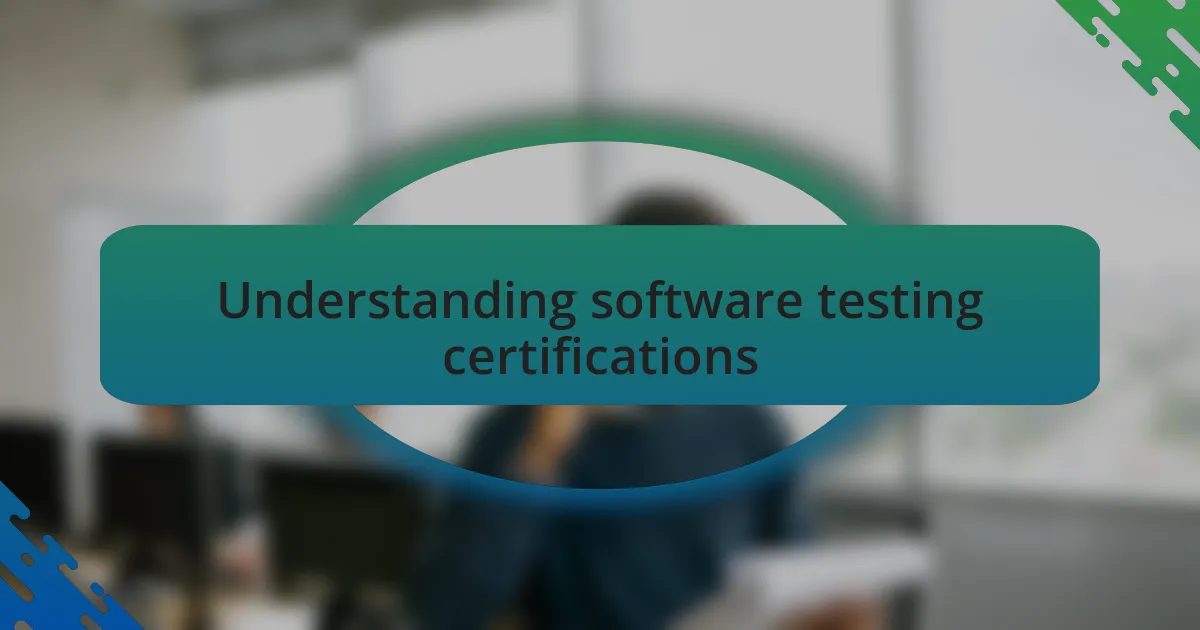
Understanding software testing certifications
When I first encountered software testing certifications, I was both intrigued and overwhelmed. With so many options available, I often wondered which certification would genuinely enhance my career. It’s not just about the badge on your resume; it’s about gaining a deeper understanding of testing methodologies and elevating your skills.
As I delved into different certifications, I discovered that each one targets unique aspects of testing. For instance, the ISTQB Foundation Level opened my eyes to fundamental testing concepts and best practices, which I found invaluable in my daily work. It’s one thing to read about testing; experiencing it in a structured way made the theories come alive for me.
Reflecting on my journey, I realize that pursuing these certifications isn’t just a means to an end. It’s an emotional investment, a commitment to quality and excellence in software development. How many times have you faced challenges that seemed insurmountable? With the right certification, I learned not only how to tackle these challenges but also how to approach problem-solving with confidence and a fresh perspective.
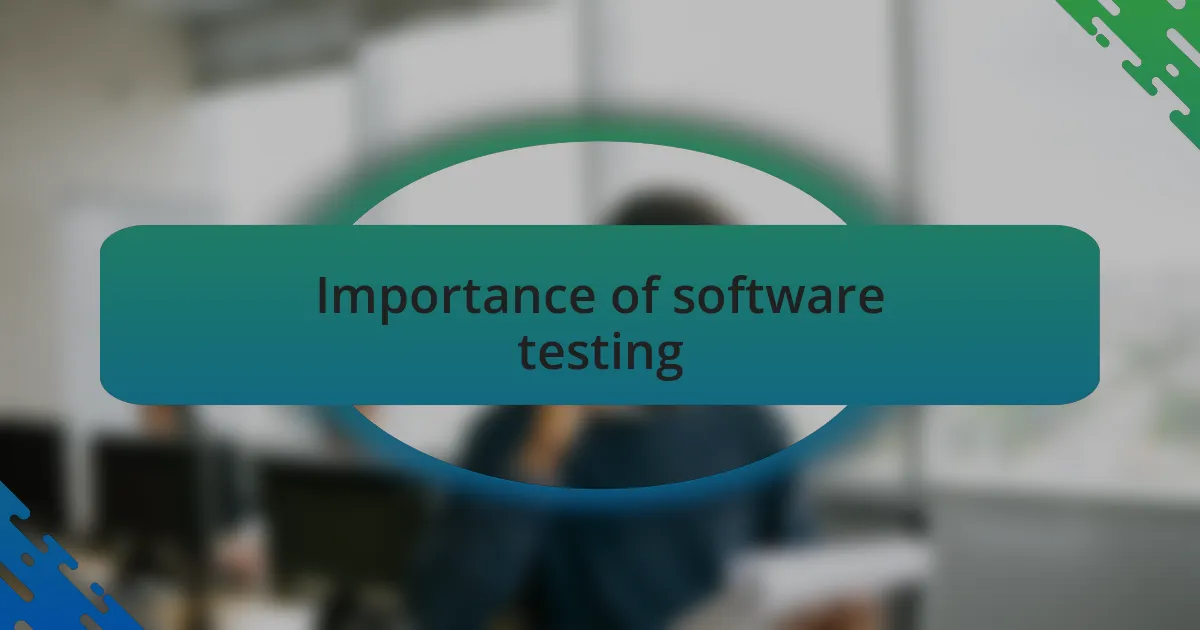
Importance of software testing
Software testing is crucial because it ensures that applications function as intended. I remember working on a project where a minor bug slipped past our initial checks. That small oversight led to significant setbacks, highlighting just how essential thorough testing really is. It’s not only about identifying defects; it’s about ensuring a smooth user experience that fosters trust and reliability.
Moreover, effective software testing directly impacts user satisfaction and company reputation. I once saw a competitor falter due to a poorly tested product that launched with glaring issues. Witnessing the backlash they faced made me realize the stakes involved in this process. If we want our products to resonate with users, we must prioritize comprehensive testing.
As I’ve learned, rigorous testing isn’t optional; it’s fundamental to success in software development. Have you ever wondered how many projects fail due to insufficient testing? Reflecting on my own experiences, I can confidently say that investing time in testing pays dividends. When I see a product launch smoothly, I feel a sense of pride knowing that our dedication to testing played a pivotal role in that success.
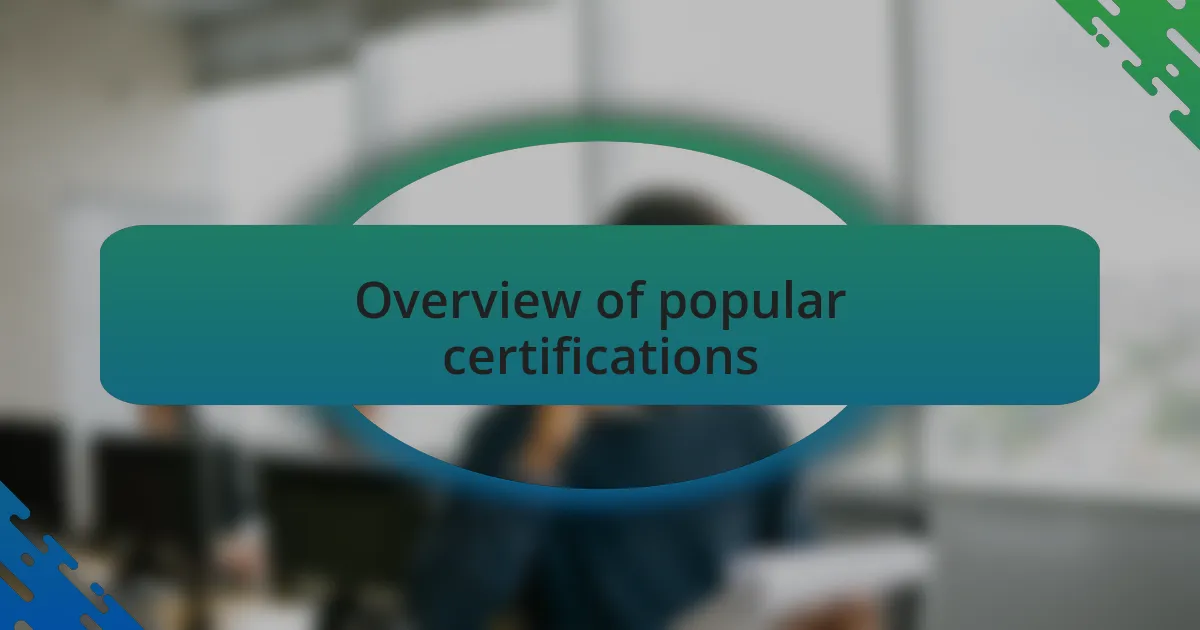
Overview of popular certifications
When it comes to software testing certifications, a few stand out due to their widespread recognition and value in the industry. The ISTQB (International Software Testing Qualifications Board) certification is among the most popular, offering a solid foundation in testing principles and practices. I remember studying for my ISTQB exam; the concepts I learned not only boosted my confidence but also significantly improved my testing skills on the job.
Another noteworthy certification is the Certified Software Tester (CSTE), which emphasizes testing methodologies and provides a deeper understanding of the testing lifecycle. Personally, I found the real-world scenarios presented in the CSTE coursework to be incredibly valuable. They allowed me to apply theoretical knowledge to practical situations, which I believe is crucial for anyone pursuing a testing career.
Then there’s the Agile Testing Certification, catering specifically to those working in agile environments. Given the fast-paced nature of agile development, I’ve seen how understanding agile testing practices can make a world of difference. It’s invigorating to think about how these certifications can shape one’s career trajectory, isn’t it? I often encourage fellow testers to consider these certifications as stepping stones to enhance their skill set and professional growth in an ever-evolving field.
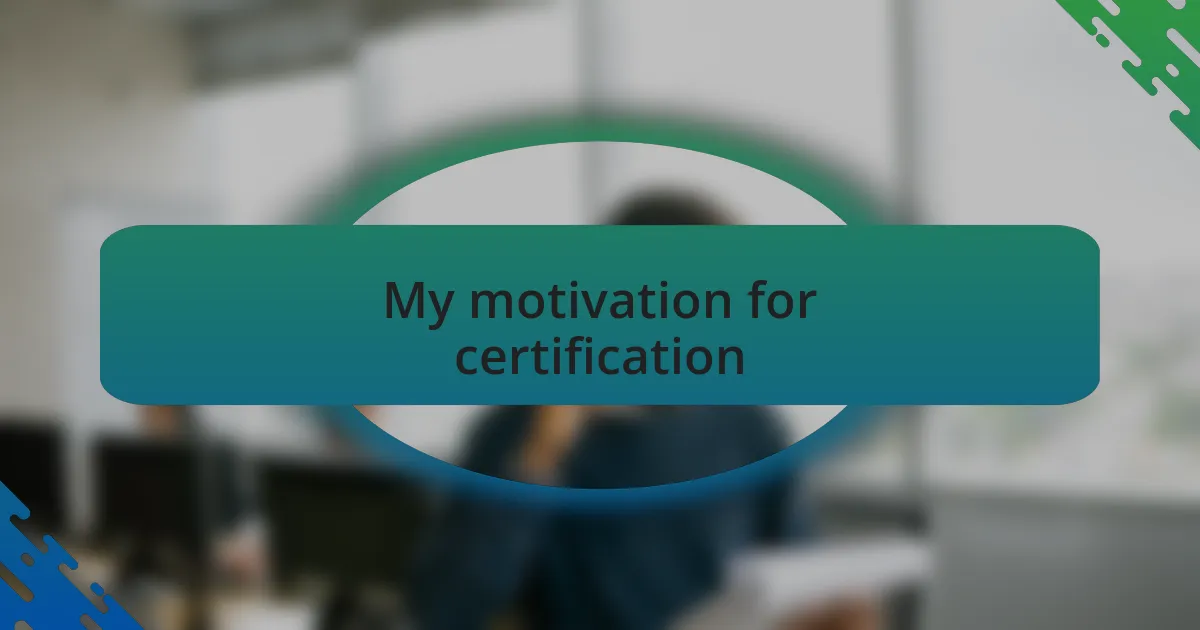
My motivation for certification
My motivation for pursuing certifications in software testing stemmed mainly from a desire to solidify my skills and elevate my career. I vividly recall the moment I realized I was often second-guessing my approaches during projects, and that sparked a determination to gain formal validation of my knowledge. Was it fear of inadequacy? Perhaps, but it pushed me to seek out the resources that would empower me and enhance my confidence.
As I navigated the certification process, I found that the structured learning environments helped to instill a sense of achievement. Each completed module and passing exam felt like a personal victory, something I could build upon. I remember the excitement I felt when I received my CSTE certificate; it was more than just a piece of paper to me. It represented countless hours of study and growth.
Moreover, networking and engaging with other professionals motivated me further. Hearing their success stories and struggles really illuminated the importance of ongoing education in our field. Have you ever had a conversation that inspired you to take action? For me, those interactions made it clear that certifications were not just beneficial; they were essential for career advancement, fostering a community of learning and support that continues to fuel my passion for software testing.
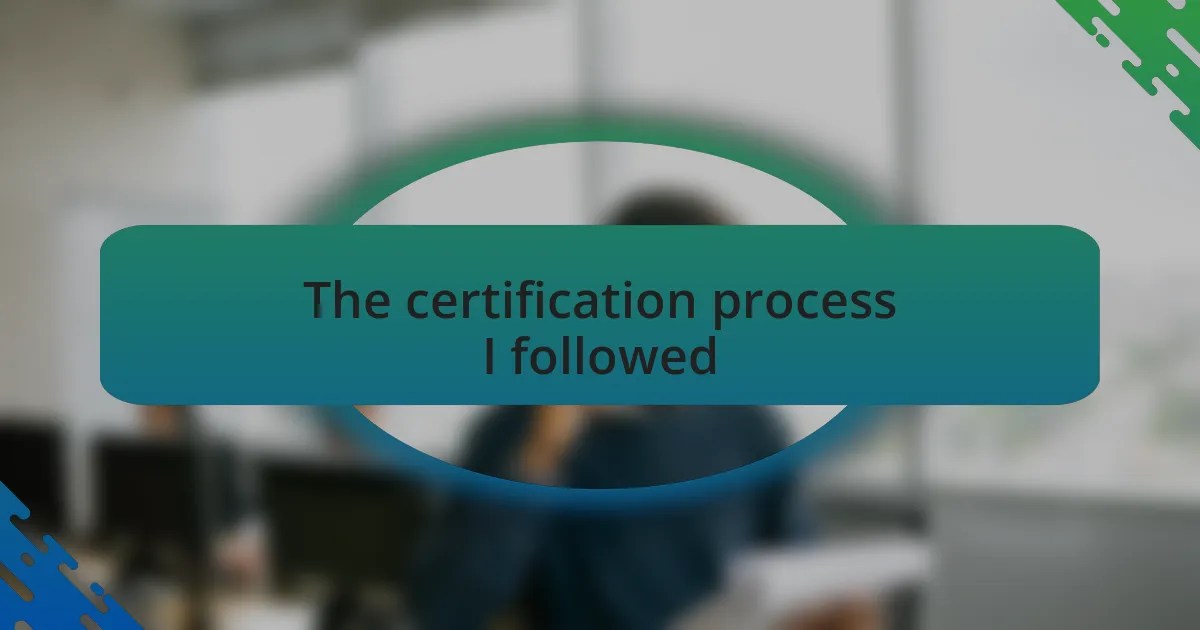
The certification process I followed
The certification process I followed was thorough and, to be honest, a bit daunting at times. I started with online courses that provided a comprehensive curriculum on foundational testing concepts. Each module demanded my full attention, and I remember feeling overwhelmed during the first few lessons. But as I persisted, the material started to click, and I found myself excited to share insights with peers.
When it came time for the exams, my nerves kicked in. I can distinctly recall sitting at my desk, surrounded by notes and flashcards, wondering if all my studying would pay off. I often asked myself, “Am I truly prepared for this?” The answer bolstered my determination; I pushed through those last-minute cram sessions, fueled by the thought of achieving tangible recognition for my hard work.
After receiving my certification, I felt a wave of relief and joy. That moment wasn’t just about the accolade; it validated every late night and every ounce of effort I had put in. I often reflect on my experience and realize that this process not only equipped me with knowledge but also instilled a deeper sense of commitment to my career in software testing.
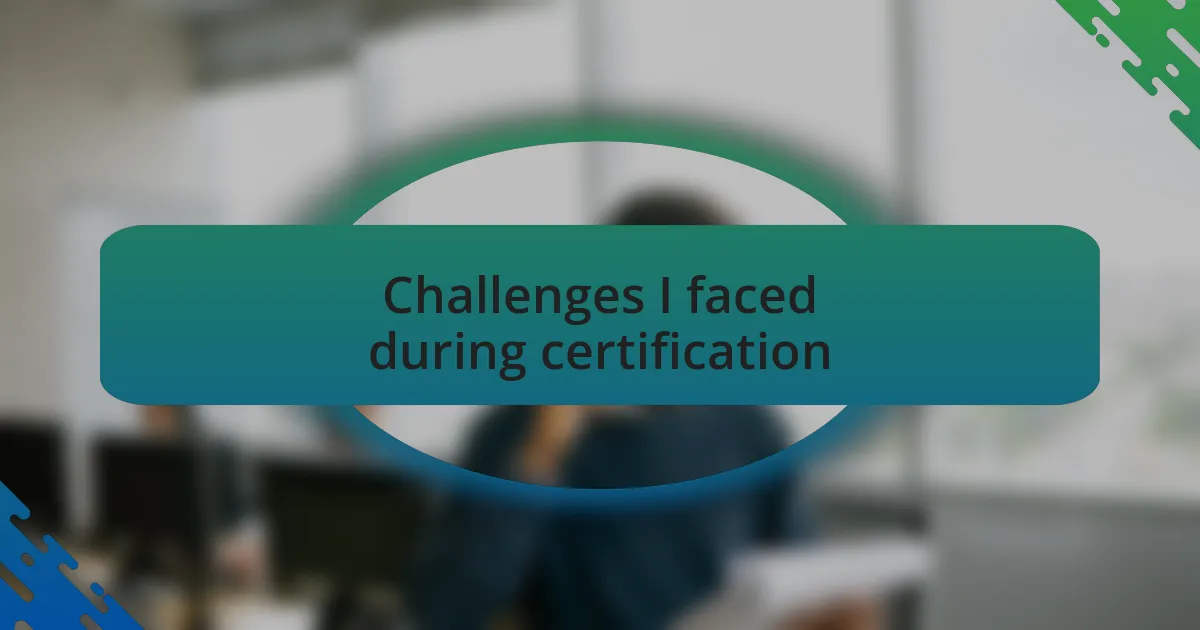
Challenges I faced during certification
One major challenge I faced during my certification journey was managing my time effectively. Balancing a full-time job with the demands of studying was no easy feat. There were days when I wondered if I had bitten off more than I could chew, especially during weeks when project deadlines loomed on the horizon. I quickly learned the importance of creating a structured study schedule and sticking to it; without that, I often found myself scrambling to catch up during weekends.
Another hurdle came when I encountered complex concepts that felt like an insurmountable wall. I vividly remember wrestling with the intricacies of test automation frameworks. Instead of shying away from this challenge, I turned to forums and online communities for support. Engaging in discussions and asking for clarification not only helped me grasp those tough topics but also connected me with like-minded individuals who were navigating similar paths. Have you ever faced a steep learning curve? I certainly have, and reaching out was a game-changer for my understanding.
Finally, the pressure of the exam day itself was something I hadn’t fully anticipated. As I flipped through the questions, I could feel my heart racing. I kept asking myself if I’d remember everything I had studied. To combat this anxiety, I practiced deep breathing and positive affirmations leading up to the test. This mental preparation proved invaluable when it was time to actually sit for the exam, reminding me that I had already conquered numerous challenges just to get there.